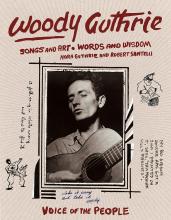The author of more than three thousand folk songs, Woody Guthrie (1912–1967) is one of the most influential songwriters and recording artists in American history. He is an icon of the Depression era and wrote the world’s most famous protest song, “This Land Is Your Land.” But he was not only a songwriter, and his subject matter extended well beyond labor politics. The full corpus of his creativity—including lyrics, poetry, artwork, and largely unpublished prose writings—encompassed topics such as the environment, love, sex, spirituality, family, and racial justice. Guthrie created a personal philosophy that has impacted generations of Americans and inspired musician-activists from Pete Seeger and Bruce Springsteen to Ani DiFranco and Chuck D. As Bob Dylan noted of Guthrie, “You could listen to his songs and actually learn how to live.”
Curated in collaboration with the Woody Guthrie Center, Woody Guthrie Publications, and music historian Bob Santelli, Woody Guthrie: People Are the Song tells the story of the great American troubadour and writer in his own words and by his own hand through an extraordinary selection of musical instruments, handwritten lyrics, manuscripts, photographs, books, art, and audiovisual media, assembled from the preeminent holdings of the Woody Guthrie Archive and several private collections. The show traces Guthrie’s life and career through his artistic response to several interrelated themes: place, politics, family, love, and spirituality. Running through these themes is an emphasis on Guthrie’s connection to “people”: to specific people in his life, historical figures of his era, and the anonymous workers, soldiers, and immigrants whose stories appear in so much of his music. Songs like “My Thirty Thousand,” “Deportee,” “The Blinding of Isaac Woodard,” and “Union Maid” express Guthrie’s outrage at the racial and labor injustices felt by his fellow Americans, while lyrics to “Ingrid Bergman” and “Joe DiMaggio” speak to his interest in prominent figures of the 1940s and the compelling stories of their lives. Time and again this exhibition captures Guthrie’s powers as a raconteur for the people—he had an uncanny ability to distill a news story or the account of someone’s life into a topical ballad or protest song. As he explains in a notebook kept in 1942, “there is no real trick of creating words to set to music once you realize that the word is the music and the people are the song.”
This exhibition is presented by the Woody Guthrie Center and Woody Guthrie Publications, in collaboration with the Morgan Library & Museum.

Woody Guthrie: People Are the Song is made possible by the Sherman Fairchild Fund for Exhibitions, the Charles E. Pierce, Jr. Fund for Exhibitions, Richard and Ronay Menschel, and the Margaret T. Morris Fund for Americana. Additional support is provided by Liz and Rod Berens, and Jon and Barbara Landau.
Photography by Robin Carson, courtesy of Woody Guthrie Archives.

